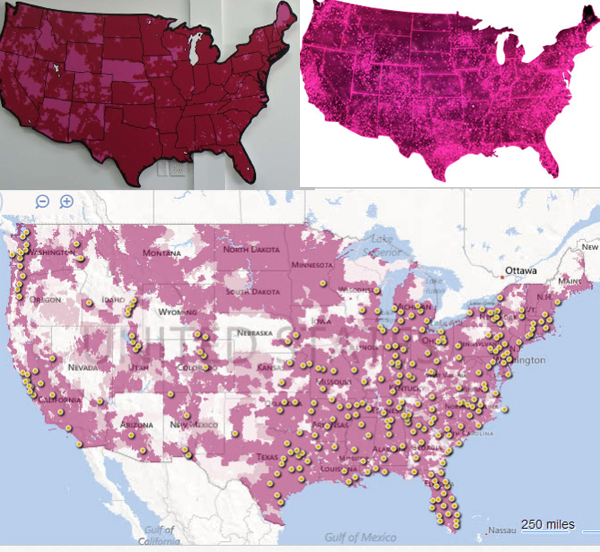T-Mobile Wins Legal Battle Against AT&T Subsidiary Over The Color Magenta

A comparison used by T-Mobile in its case against Aio. At top left is a coverage map Aio had used in stores. Top left is T-Mobile’s coverage map from its website. The bottom map is how Aio previously detailed its coverage on the Aio website; that map has since been changed to use a different color scheme.
T-Mobile had argued that the similarities in its color scheme and that of Aio’s combined with the fact that they are both players in the same, relatively small wireless industry, consumers could become confused and think the two brands are related.
Aio had contended that its “plum” color was different enough from the magenta used by T-Mobile and that T-Mobile was going too far in trying to made a trademark claim about an entire range of colors.
“T-Mobile needs an art lesson,” a rep for the company told Consumerist at the time the suit was filed. “Aio doesn’t do magenta.”
In the lengthy ruling, [PDF] the court found that while there was no evidence that Aio deliberately set out to cause confusion or appear similar to T-Mobile, “the record also contains evidence that AT&T recognized that Aio plum could be confusingly close to magenta and proceeded nonetheless.”
As for any evidence that consumers may have become confused by the vaguely similar marks, the court found that “such evidence is not required. The record is clear that T-Mobile has spent billions of dollars developing its brand and its identification with the color magenta. Consumers associate magenta with T-Mobile.”
The judge also points out that all the major wireless companies have long associated themselves with distinct colors — Verizon is red and black, AT&T is orange and blue, Sprint has been yellow and black since acquiring Nextel, and T-Mobile is magenta and white. These color combinations have become shorthand in advertising and marketing to let consumers know which provider you’re talking about.
“When asked why a company would spend millions (as in the case of Aio) or billions (as in the case of T-Mobile) to develop and use colors to differentiate brands if it would have no effect on consumers’ decisions, Aio did not provide a sufficient answer,” writes the judge.
And so the court has ruled that Aio may no longer use “large blocks or swaths” of its plum color (Pantone 676, for those keeping track at home) in its advertising and marketing.
In a statement, T-Mobile says it is “very pleased” by the ruling.
When reached for comment, a rep for Aio told Consumerist, “While we disagree with the court’s decision, it addresses advertising and store designs that we are no longer implementing. Accordingly, this decision has no effect on our advertising plans.”
Want more consumer news? Visit our parent organization, Consumer Reports, for the latest on scams, recalls, and other consumer issues.

